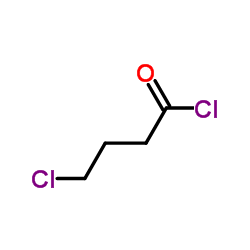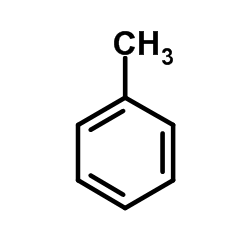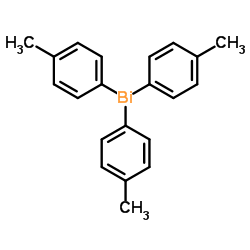4-chloro-4'-methylbutyrophenone

4-chloro-4'-methylbutyrophenone structure
|
Common Name | 4-chloro-4'-methylbutyrophenone | ||
|---|---|---|---|---|
| CAS Number | 38425-26-2 | Molecular Weight | 196.67300 | |
| Density | 1.082g/cm3 | Boiling Point | 309.7ºC at 760mmHg | |
| Molecular Formula | C11H13ClO | Melting Point | 31.5ºC | |
| MSDS | N/A | Flash Point | 164.3ºC | |
| Name | 4-chloro-1-(4-methylphenyl)butan-1-one |
|---|---|
| Synonym | More Synonyms |
| Density | 1.082g/cm3 |
|---|---|
| Boiling Point | 309.7ºC at 760mmHg |
| Melting Point | 31.5ºC |
| Molecular Formula | C11H13ClO |
| Molecular Weight | 196.67300 |
| Flash Point | 164.3ºC |
| Exact Mass | 196.06500 |
| PSA | 17.07000 |
| LogP | 3.19670 |
| Index of Refraction | 1.52 |
Synonym:4-Chloro-1-(4-methylphenyl)-1-butanon Section 2 - COMPOSITION, INFORMATION ON INGREDIENTS
Risk Phrases: None Listed. Section 3 - HAZARDS IDENTIFICATION EMERGENCY OVERVIEW
The toxicological properties of this material have not been fully investigated. Potential Health Effects Eye: May cause eye irritation. Skin: May cause skin irritation. Ingestion: May cause gastrointestinal irritation with nausea, vomiting and diarrhea. No information found. Inhalation: May cause respiratory tract irritation. The toxicological properties of this substance have not been fully investigated. Chronic: No information found. Section 4 - FIRST AID MEASURES Eyes: Flush eyes with plenty of water for at least 15 minutes, occasionally lifting the upper and lower eyelids. Get medical aid immediately. Skin: Flush skin with plenty of water for at least 15 minutes while removing contaminated clothing and shoes. Get medical aid if irritation develops or persists. Ingestion: Do not induce vomiting. If victim is conscious and alert, give 2-4 cupfuls of milk or water. Never give anything by mouth to an unconscious person. Get medical aid. Inhalation: Remove from exposure and move to fresh air immediately. If not breathing, give artificial respiration. If breathing is difficult, give oxygen. Get medical aid if cough or other symptoms appear. Notes to Physician: Section 5 - FIRE FIGHTING MEASURES General Information: As in any fire, wear a self-contained breathing apparatus in pressure-demand, MSHA/NIOSH (approved or equivalent), and full protective gear. Extinguishing Media: Use water spray, dry chemical, carbon dioxide, or chemical foam. Section 6 - ACCIDENTAL RELEASE MEASURES General Information: Use proper personal protective equipment as indicated in Section 8. Spills/Leaks: Vacuum or sweep up material and place into a suitable disposal container. Clean up spills immediately, observing precautions in the Protective Equipment section. Section 7 - HANDLING and STORAGE Handling: Wash thoroughly after handling. Wash hands before eating. Use with adequate ventilation. Avoid breathing dust, vapor, mist, or gas. Avoid contact with skin and eyes. Avoid ingestion and inhalation. Storage: Store in a cool, dry place. Store in a tightly closed container. Section 8 - EXPOSURE CONTROLS, PERSONAL PROTECTION Engineering Controls: Good general ventilation should be sufficient to control airborne levels. Exposure Limits CAS# 38425-26-2: Personal Protective Equipment Eyes: Wear appropriate protective eyeglasses or chemical safety goggles as described by OSHA's eye and face protection regulations in 29 CFR 1910.133 or European Standard EN166. Skin: Wear appropriate protective gloves to prevent skin exposure. Clothing: Wear appropriate protective clothing to prevent skin exposure. Respirators: Follow the OSHA respirator regulations found in 29 CFR 1910.134 or European Standard EN 149. Use a NIOSH/MSHA or European Standard EN 149 approved respirator if exposure limits are exceeded or if irritation or other symptoms are experienced. Section 9 - PHYSICAL AND CHEMICAL PROPERTIES Physical State: Solid Color: orange-brown Odor: Not available. pH: Not available. Vapor Pressure: Not available. Viscosity: Not available. Boiling Point: Not available. Freezing/Melting Point: 31.5 deg C Autoignition Temperature: Not available. Flash Point: Not available. Explosion Limits, lower: Not available. Explosion Limits, upper: Not available. Decomposition Temperature: Solubility in water: Specific Gravity/Density: Molecular Formula: C11H13ClO Molecular Weight: 196.68 Section 10 - STABILITY AND REACTIVITY Chemical Stability: Stable under normal temperatures and pressures. Conditions to Avoid: Incompatible materials. Incompatibilities with Other Materials: Strong oxidizing agents. Hazardous Decomposition Products: Hydrogen chloride, carbon monoxide, carbon dioxide. Hazardous Polymerization: Has not been reported. Section 11 - TOXICOLOGICAL INFORMATION RTECS#: CAS# 38425-26-2 unlisted. LD50/LC50: Not available. Carcinogenicity: 4-Chloro-4'-methylbutyrophenone, 95% - Not listed by ACGIH, IARC, or NTP. Section 12 - ECOLOGICAL INFORMATION Section 13 - DISPOSAL CONSIDERATIONS Dispose of in a manner consistent with federal, state, and local regulations. Section 14 - TRANSPORT INFORMATION IATA Not regulated as a hazardous material. IMO Not regulated as a hazardous material. RID/ADR Not regulated as a hazardous material. Section 15 - REGULATORY INFORMATION European/International Regulations European Labeling in Accordance with EC Directives Hazard Symbols: Not available. Risk Phrases: Safety Phrases: S 24/25 Avoid contact with skin and eyes. WGK (Water Danger/Protection) CAS# 38425-26-2: No information available. Canada None of the chemicals in this product are listed on the DSL/NDSL list. CAS# 38425-26-2 is not listed on Canada's Ingredient Disclosure List. US FEDERAL TSCA CAS# 38425-26-2 is not listed on the TSCA inventory. It is for research and development use only. SECTION 16 - ADDITIONAL INFORMATION N/A |
| Safety Phrases | 24/25 |
|---|---|
| HS Code | 2914700090 |
|
~92% 
4-chloro-4'-met... CAS#:38425-26-2 |
| Literature: Merrell Pharmaceuticals, Inc. Patent: US6348597 B2, 2002 ; Location in patent: Page column 24 ; |
|
~97% 
4-chloro-4'-met... CAS#:38425-26-2 |
| Literature: Merrell Pharmaceuticals Inc. Patent: US6340761 B1, 2002 ; Location in patent: Page column 24-25 ; |
|
~78% 
4-chloro-4'-met... CAS#:38425-26-2 |
| Literature: Rao, Maddali L.N.; Venkatesh, Varadhachari; Banerjee, Debasis Tetrahedron, 2007 , vol. 63, # 52 p. 12917 - 12926 |
|
~% 
4-chloro-4'-met... CAS#:38425-26-2 |
| Literature: Pablo, Oscar; Guijarro, David; Yus, Miguel Journal of Organic Chemistry, 2013 , vol. 78, # 18 p. 9181 - 9189 |
| HS Code | 2914700090 |
|---|---|
| Summary | HS: 2914700090 halogenated, sulphonated, nitrated or nitrosated derivatives of ketones and quinones, whether or not with other oxygen function Tax rebate rate:9.0% Supervision conditions:none VAT:17.0% MFN tariff:5.5% General tariff:30.0% |
| 4-Chlor-1-p-tolyl-butan-1-on |
| 4-Chloro-1-(4-methyl-phenyl)-butan-1-one |
| 4-Chloro-4′-methylbutyrophenone |
| 4-CHLORO-4'-METHYLBUTYROPHENONE |
| 4-chloro-1-(4-methylphenyl)-1-butanone |
| 4-CHLORO-1-(4-METHYLPHENYL)-1-OXOBUTANE |
| EINECS 253-924-3 |
| 4-chloro-1-p-tolyl-butan-1-one |
| 4-Chloro-4‘-methylbutyrophenone |




